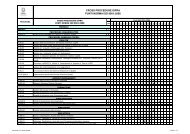Sure Start: a 'joined-up' approach to reducing child poverty
Sure Start: a 'joined-up' approach to reducing child poverty
Sure Start: a 'joined-up' approach to reducing child poverty
You also want an ePaper? Increase the reach of your titles
YUMPU automatically turns print PDFs into web optimized ePapers that Google loves.
The EU Social Protection Social Inclusion Process > Good Practice Article<br />
<strong>Sure</strong> <strong>Start</strong>: a ‘joined-up’<br />
<strong>approach</strong> <strong>to</strong> <strong>reducing</strong><br />
<strong>child</strong> <strong>poverty</strong><br />
Overlaps and conflicts in government<br />
ministries, a common problem in many EU<br />
Member States, often results in fragmented<br />
services for disadvantaged <strong>child</strong>ren and their<br />
families. <strong>Sure</strong> <strong>Start</strong>, the British Government’s<br />
flagship strategy for tackling <strong>child</strong> <strong>poverty</strong> and<br />
social exclusion, developed a successful<br />
integrated <strong>approach</strong> that promises <strong>to</strong> inspire<br />
similar solutions in other EU countries. A peer<br />
review meeting <strong>to</strong>ok place in London in May<br />
2006 <strong>to</strong> analyse the transferability of the<br />
programme <strong>to</strong> other Member States.<br />
Launched in 1999, <strong>Sure</strong> <strong>Start</strong> is designed <strong>to</strong><br />
benefit <strong>child</strong>ren, parents and communities by<br />
increasing the availability of <strong>child</strong>care for all,<br />
improving young <strong>child</strong>ren’s health and emotional<br />
development. It also supports parents in both<br />
parenting skills and employment. The programme<br />
helps develop services in disadvantaged areas<br />
and offers financial help so that parents can afford<br />
<strong>child</strong>care. Community control, exercised through<br />
local partnerships, is the overarching principle.<br />
of the mother’s pregnancy right through until the<br />
<strong>child</strong>ren reach the age of 14, or 16 in the case of<br />
those with disabilities.<br />
• Linking services key<br />
When the Labour government came <strong>to</strong> power in<br />
the UK in 1997, it brought with it a new <strong>approach</strong><br />
<strong>to</strong> providing public services: moving away from the<br />
idea that the welfare of young <strong>child</strong>ren is the sole<br />
responsibility of individual families and that public<br />
authorities have no role <strong>to</strong> play. In the late 1990s,<br />
one-third of <strong>child</strong>ren in Britain were living in<br />
<strong>poverty</strong>. Early <strong>child</strong>hood services, such as care<br />
and education, were poor by western European<br />
standards. In addition, different departments were<br />
spending money without liaising with one another.<br />
“Creating ‘joined-up government’ was a major<br />
objective in the UK at the end of the 1990s,” said<br />
Fred Deven, the thematic experts contracted by<br />
the European Commission <strong>to</strong> introduce the<br />
debates and report on the meeting. “The<br />
innovative aspect and success of <strong>Sure</strong> <strong>Start</strong> lies in<br />
this joined-up <strong>approach</strong>. It means that local<br />
authorities, health services, job centres, local<br />
communities, public agencies and voluntary and<br />
private sec<strong>to</strong>r organisations all work <strong>to</strong>gether <strong>to</strong><br />
provide services that benefit <strong>child</strong>ren and their<br />
families in an integrated way.”<br />
Local <strong>Sure</strong> <strong>Start</strong> programmes were initially<br />
launched in the most deprived areas of England.<br />
By early May 2006, 846 <strong>child</strong>ren’s centres covering<br />
approximately 660,000 <strong>child</strong>ren were in operation.<br />
The government is committed <strong>to</strong> creating a<br />
<strong>child</strong>ren’s centre for every community – 3,500 by<br />
2010. Between 2004 and 2008 the Department is<br />
planning <strong>to</strong> spend a <strong>to</strong>tal of £3.2 billion on<br />
<strong>child</strong>ren’s centres and <strong>Sure</strong> <strong>Start</strong> local<br />
programmes. The ultimate aim of the programme<br />
is <strong>to</strong> provide universal services <strong>to</strong> every community<br />
in the country.<br />
Through <strong>child</strong>ren’s centres and extended schools<br />
services, <strong>Sure</strong> <strong>Start</strong> supports families from the time<br />
The European Union’s commitment<br />
<strong>to</strong> social protection and social inclusion<br />
http://ec.europa.eu/employment_social/spsi<br />
European Commission
The EU Social Protection Social Inclusion Process > Good Practice Article<br />
• Common challenges, common solutions<br />
France, Hungary, Latvia, Lithuania, Malta and<br />
Poland are grappling with similar challenges <strong>to</strong><br />
those faced by the UK in the 1990s. With help from<br />
the EU’s Social Protection and Social Inclusion<br />
Process, experts from these countries had the<br />
opportunity <strong>to</strong> evaluate <strong>Sure</strong> <strong>Start</strong>, look at sample<br />
schemes and discuss if some or all of the<br />
<strong>approach</strong> could be used in their own countries.<br />
One fact <strong>to</strong> emerge strongly from comparative<br />
analysis in all countries was that help for<br />
disadvantaged <strong>child</strong>ren often cuts across various<br />
ministries, as well as across the specialisations<br />
and interests of different professional groups. The<br />
resulting overlaps and conflicts often lead <strong>to</strong><br />
fragmented services that are less than optimal for<br />
helping <strong>child</strong>ren and families in need. <strong>Sure</strong> <strong>Start</strong>’s<br />
integrated <strong>approach</strong> was seen as a successful,<br />
and by and large transferable, means of promoting<br />
greater cooperation.<br />
“These discussions have shown that it is<br />
necessary <strong>to</strong> break down the barriers between<br />
different agencies,” said Hugues Feltesse, from the<br />
EU’s DG Employment, Social Affairs and Equal<br />
Opportunities. “This is not just a matter of writing<br />
new rules. It implies a change of culture.”<br />
The peer review brought out a number of points<br />
about the <strong>Sure</strong> <strong>Start</strong> programme’s transferability <strong>to</strong><br />
other countries:<br />
• Increased cooperation between the various<br />
groups of professionals is equally important.<br />
Joint training could be provided for the various<br />
professionals involved in <strong>child</strong>care, in order <strong>to</strong><br />
promote networking, team working in a multiprofessional<br />
<strong>approach</strong> and partnership with<br />
poor people.<br />
• The joined-up, holistic <strong>approach</strong> taken by <strong>Sure</strong><br />
<strong>Start</strong>’s new <strong>child</strong>ren’s centres was of great<br />
interest <strong>to</strong> participants from countries where<br />
services were more fragmented. The existence<br />
also of outreach services, the work with all the<br />
parents in the area with a snowball effect, the<br />
parent <strong>to</strong> parent support, the flexibility of open<br />
hours and activities, specific meetings with<br />
teen-agers, the presence of professionals<br />
belonging <strong>to</strong> same ethnic minorities than<br />
families in the area, were highly appreciated.<br />
• <strong>Sure</strong> <strong>Start</strong>’s emphasis on evaluation and<br />
moni<strong>to</strong>ring is an element that participants were<br />
keen <strong>to</strong> recommend. Personnel also need <strong>to</strong><br />
be helped <strong>to</strong> self-moni<strong>to</strong>r and self-evaluate.<br />
Longitudinal assessment of results proving the<br />
cost effectiveness remains a challenge <strong>to</strong><br />
meet.<br />
• The level of parental involvement in <strong>Sure</strong> <strong>Start</strong><br />
local programmes, notably through the<br />
partnership boards, was praised. To build a<br />
long term relationship with families living in<br />
<strong>poverty</strong> in such a way <strong>to</strong> foster trust is a key<br />
issue. Parents must be kept informed of the<br />
<strong>child</strong>’s development. <strong>Sure</strong> <strong>Start</strong> centres have<br />
developed useful systems for doing so.<br />
• <strong>Sure</strong> <strong>Start</strong> focuses on <strong>child</strong> development and<br />
the global well-being of the <strong>child</strong>ren. This was<br />
seen as a positive value that could be<br />
transferred <strong>to</strong> different national contexts<br />
overcoming the limits of the only health<br />
protection constraints.<br />
The European Union’s commitment<br />
<strong>to</strong> social protection and social inclusion<br />
http://ec.europa.eu/employment_social/spsi<br />
European Commission
The EU Social Protection Social Inclusion Process > Good Practice Article<br />
• The <strong>Sure</strong> <strong>Start</strong> programme incorporates some<br />
freedom of local action but also a level of<br />
control. This combination was seen as a useful<br />
way of promoting standards.<br />
exchanges of national experience have been<br />
useful for all concerned.”<br />
21 June 2007<br />
• Accountability <strong>to</strong> the various stakeholders<br />
(parents, employees, policy-makers, funders)<br />
is important in ensuring value for money.<br />
• Interest was shown in <strong>Sure</strong> <strong>Start</strong>’s role in<br />
helping parents in<strong>to</strong> employment as a means<br />
of tackling <strong>poverty</strong>. Some doubts were<br />
expressed as <strong>to</strong> whether a combination of<br />
<strong>child</strong>care and employment promotion would<br />
work in every national context. However a<br />
strong partnership between <strong>child</strong> centres, job<br />
centres, training services, enterprises could be<br />
interesting <strong>to</strong> promote. Decent wages,<br />
sufficient <strong>to</strong> bring up a family, are needed in<br />
order <strong>to</strong> motivate people. Training<br />
opportunities and <strong>child</strong>care also have <strong>to</strong> be<br />
upgraded.<br />
• Financial constraints are a sore point for all<br />
peer countries. If <strong>Sure</strong> <strong>Start</strong> centres were set<br />
up, would there be any guarantee of continued<br />
funding after the first 2-3 years And in<br />
countries with limited financial means, is there<br />
not a danger that a <strong>Sure</strong> <strong>Start</strong> <strong>approach</strong> would<br />
create a few centres of excellence amidst a<br />
general lack of coverage<br />
“Whatever the national context, the<br />
problems are similar and the solutions<br />
are similar. So the exchanges of national<br />
experience have been useful for all<br />
concerned”<br />
Geoff Scammell from the UK’s Department for<br />
Work and Pensions, said discussions that were<br />
made possible by the Social Protection and Social<br />
Inclusion Process had shown far more similarities<br />
than differences between the countries involved.<br />
“Whatever the national context, the problems are<br />
similar and the solutions are similar. So the<br />
Project information<br />
Name of the initiative: <strong>Sure</strong> <strong>Start</strong><br />
Website: www.surestart.gov.uk<br />
Activity: Peer Review<br />
Country: UK<br />
Scope: National<br />
SPSI Priority theme: Child <strong>poverty</strong><br />
Year: 1999 –<br />
EU funding: None<br />
Coordina<strong>to</strong>r:<br />
European Commission<br />
DG Employment, Social Affairs and Equal<br />
Opportunities<br />
Email: empl-E2@ec.europa.eu<br />
Website: ec.europa.eu/employement_social/spsi<br />
The European Union’s commitment<br />
<strong>to</strong> social protection and social inclusion<br />
http://ec.europa.eu/employment_social/spsi<br />
European Commission


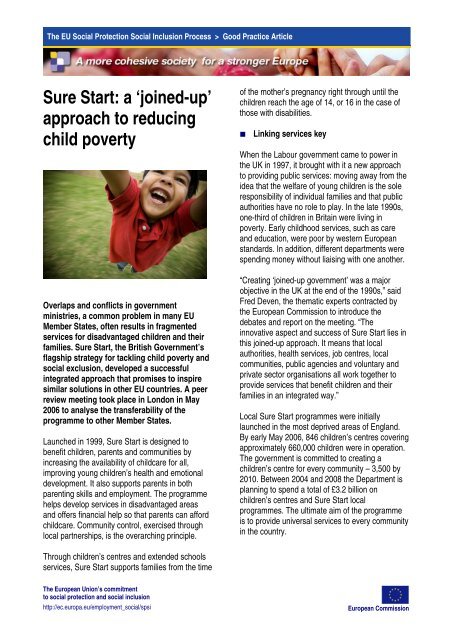
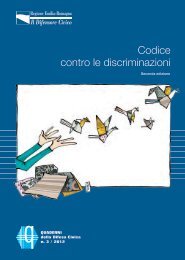
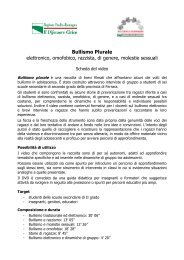
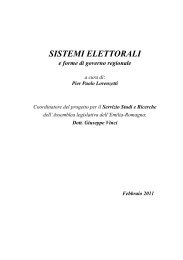
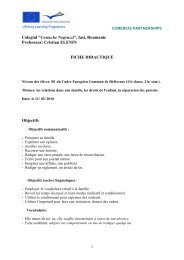

![27. [pdf] dal consiglio all'assemblea - Assemblea Legislativa](https://img.yumpu.com/34580490/1/190x249/27-pdf-dal-consiglio-allassemblea-assemblea-legislativa.jpg?quality=85)
![[PDF] Il Difensore civico regionale - Assemblea Legislativa](https://img.yumpu.com/33464159/1/184x260/pdf-il-difensore-civico-regionale-assemblea-legislativa.jpg?quality=85)
![[PDF] Classe 4B - Assemblea Legislativa](https://img.yumpu.com/31755709/1/184x260/pdf-classe-4b-assemblea-legislativa.jpg?quality=85)
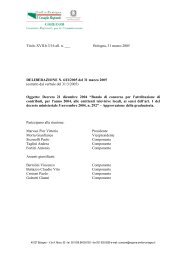
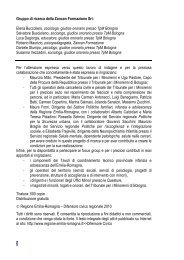
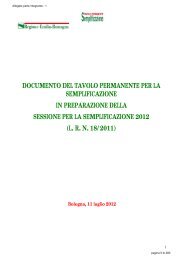
![[pdf] manuale qualità - Assemblea Legislativa](https://img.yumpu.com/29722210/1/184x260/pdf-manuale-qualita-assemblea-legislativa.jpg?quality=85)

